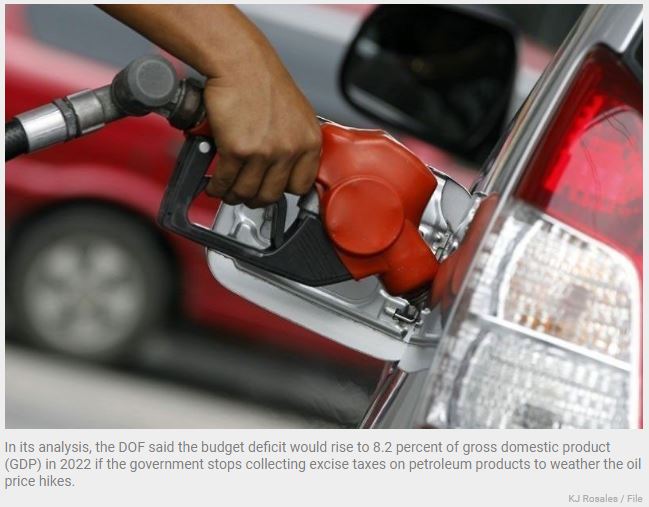Philippines: Fuel tax suspension to hike government borrowings, says DOF
MANILA, Philippines — The suspension of the fuel excise tax would cut into the government’s revenue collection and force more borrowings, causing the national debt to spiral to over 61 percent of the economy, the Department of Finance said.
In its analysis, the DOF said the budget deficit would rise to 8.2 percent of gross domestic product (GDP) in 2022 if the government stops collecting excise taxes on petroleum products to weather the oil price hikes.
As a consequence, the government will be left with no choice but to increase its borrowings at a time when financing costs are going up due to the looming US rate hikes and the Russia-Ukraine war in Europe.
Finance Secretary Carlos Dominguez III said the debt-to-GDP ratio would then leap to a 17-year high of 61.4 percent from a projected 60.9 percent. In 2021, the debt level went up to 60.5 percent of the economy, surpassing the 60 percent threshold observed by credit monitors and multilateral lenders.
“The situation is compounded by the rise of interest rates globally. Higher borrowings will further increase our interest payments and(fiscal) deficit in the future,” Dominguez said.
The government stands to lose at least P105.9 billion in revenue, comprised of P94.6 billion in excise taxes and P11.3 billion in value-added tax this year from the suspension of fuel taxes enforced by the Tax Reform for Acceleration and Inclusion (TRAIN) Law.
Dominguez cautioned that suspending the TRAIN taxes on petroleum products for up to 2032 would cost the government an average of P160.3 billion yearly or 0.5 percent of GDP for a total of P1.76 trillion by 2032.
Instead, the DOF chief proposed the government distribute P33 billion in unconditional cash transfer to the poorest 50 percent of the population to mitigate the impact of price surges across fuel items.
He also said suspending the fuel excise tax would only benefit the richest 10 percent of Filipinos expected to account for 48.8 percent of fuel consumption in 2022. He pointed out that the proposed measure would only cut commodity prices by 0.03 percentage point.
He added the suspension of fuel taxes would slash economic growth by 0.4 percentage point in the short run and 0.03 percentage point in the long term.
Foregone revenue resulting from the price intervention would likewise defund projects under the Build Build Build program, Dominguez said.
Through the TRAIN Law, the government charges an excise tax per liter of P10 for gasoline, P6 for diesel, P5 for kerosene and P3 for LPG.
For the year, fuel prices per liter have spiked by P13.25 for gasoline, P17.5 for diesel and P11.4 for kerosene as of March 8, pushing lawmakers to consider the passage of a measure lifting the excise taxes to provide immediate relief to consumers.
Source: https://www.philstar.com/business/2022/03/17/2167869/fuel-tax-suspension-hike-government-borrowings-says-dof


 English
English




